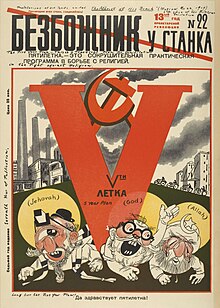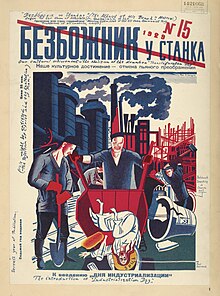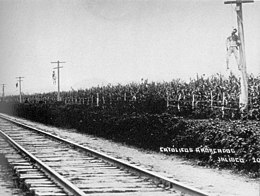State atheism
In Eastern Europe, countries like Belarus, Bulgaria, Estonia, Latvia, Russia, and Ukraine experienced strong state atheism policies.
[28] The Soviet Union attempted to suppress public religious expression over wide areas of its influence, including places such as Central Asia.
[44][45][46] The founder and primary theorist of Marxism, the 19th-century German thinker Karl Marx, had an ambivalent attitude toward religion, which he viewed as "the opium of the people", simultaneously "the sigh of" and a source of moral agency of the "oppressed creature" against their suffering.
[48] In the Marxist–Leninist interpretation of Marxist theory, developed primarily by Russian revolutionary Vladimir Lenin, atheism emanates from its dialectical materialism and tries to explain and criticize religion.
Marxism has always regarded all modern religions and churches, and each and every religious organisation, as instruments of bourgeois reaction that serve to defend exploitation and to befuddle the working class.
[55] The Communist Party engaged in diverse activities such as destroying places of worship, executing religious leaders, flooding schools and media with anti-religious propaganda, and propagated "scientific atheism".
[60][61][62][63] After the Russian Civil War, the state used its resources to stop the implanting of religious beliefs in nonbelievers and remove "prerevolutionary remnants" which still existed.
[64] During the collectivization of the land, Orthodox priests distributed pamphlets declaring that the Soviet regime was the Antichrist coming to place "the Devil's mark" on the peasants, and encouraged them to resist the government.
[68] Anti-religious and atheistic propaganda was implemented into every portion of soviet life from schools to the media and even on to substituting rituals to replace religious ones.
[65] A meeting of the Antireligious Commission of the Central Committee of the All-Union Communist Party (Bolsheviks) that occurred on 23 May 1929 estimated the portion of believers in the USSR at 80 percent, though this percentage may be understated to prove the successfulness of the struggle with religion.
[71] Since the Soviet era, Russia,[72][73] Armenia,[4] Kazakhstan,[74] Uzbekistan,[75] Turkmenistan,[76] Kyrgyzstan,[77] Tajikistan,[78] Belarus,[79][80] Moldova,[81] Georgia,[82] Ukraine[83] and Lithuania[84][85] have diverse religious affiliations.
[2] Article 37 of the Albanian Constitution of 1976 stipulated, "The state recognizes no religion, and supports atheistic propaganda in order to implant a scientific materialistic world outlook in people.
[94] The 1998 Constitution of Albania defined the country as a parliamentary republic, and established personal and political rights and freedoms, including protection against coercion in matters of religious belief.
[98] In the Gallup Global Reports 2010 survey, when asked whether religion is an important part of daily life, 39% of Albanians responded "yes" and 53% "no", which placed Albania in the lowest quartile of countries ranked by "yes" responses.
[103][104] According to Ben Kiernan, "the Khmer Rouge repressed Islam, Christianity, and Buddhism, but its fiercest extermination campaign was directed against the ethnic Cham Muslim minority.
[113][114] For much of its early history, that government maintained under Marxist thought that religion would ultimately disappear, and characterized it as emblematic of feudalism and foreign colonialism.
No one may make use of religion to engage in activities that disrupt public order, impair the health of citizens or interfere with the educational system of the state.
[35][37] In August 1960, several bishops signed a joint pastoral letter condemning communism and declaring it incompatible with Catholicism, and calling on Catholics to reject it.
"[128] Originally more tolerant of religion, the Cuban government began arresting many believers and shutting down religious schools after the Bay of Pigs Invasion.
[131][132] Pope John Paul II contributed to the Cuban thaw when he paid a historic visit to the island in 1998 and criticized the US embargo.
[134][135][136][137] The Cuban government continued hostile actions against religious groups; having ordered, in 2015 alone, the closure or demolition of over 100 Pentecostal, Methodist, and Baptist parishes, according to a report from Christian Solidarity Worldwide.
[28] The German Democratic Republic (GDR) generated antireligous regulations and promoted atheism for decades which impacted the growth of citizens affiliating with no religion from 7.6% in 1950 to 60% in 1986.
[148] In 2004, the Human Rights Overview reported that North Korea remains one of the most repressive governments, with isolation and disregard for international law making monitoring almost impossible.
[148] The North Korean government promotes the cult of personality of Kim Jong Il and Kim Il Sung, described as a political religion, as well as the Juche ideology, based on Korean ultranationalism, which calls on people to "avoid spiritual deference to outside influences", which was interpreted as including religions which originated outside Korea.
[162] The Articles were initially seldom enforced until President Plutarco Elías Calles, who sought to enact the separation of church and state established in the Constitution of 1917, took office in 1924.
[167] Due to the strict enforcement of anticlerical laws, people in strongly Catholic states, especially Jalisco, Zacatecas, Guanajuato, Colima and Michoacán, began to oppose him, and this opposition led to the Cristero War from 1926 to 1929, which was characterized by atrocities on both sides.
[171] Attempts to eliminate religious education became more pronounced in 1934 through an amendment of Article 3 of the Mexican Constitution, which strived to eliminate religion by mandating "socialist education", which "in addition to removing all religious doctrine" would "combat fanaticism and prejudices", "build[ing] in the youth a rational and exact concept of the universe and of social life".
Signatories to the convention are barred from "the use of threat of physical force or penal sanctions to compel believers or non-believers" to recant their beliefs or convert.
[183][184] Theodore Roosevelt condemned the Kishinev pogrom in 1903, establishing a history of U.S. presidents commenting on the internal religious liberty of foreign countries.
[185] Jimmy Carter asked Deng Xiaoping to improve religious freedom in China, and Ronald Reagan told US Embassy staff in Moscow to help Jews harassed by the Soviet authorities.





